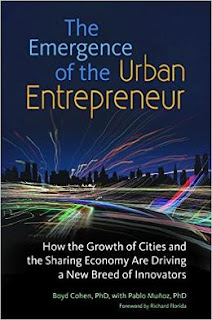(One year ago, I received an e-mail from professor Boyd Cohen -who I didn’t know at that time-, saying «Xavier, I’d like to come to Barcelona, is there some place for me?» I was impressed for his CV, and we managed to attract him here. It was a succesful history. Today, he is living in Barcelona with his family, and teaching at UVic and EADA Business School. He’s an entrepreneur and an international academic authority in Urban Innovation and Entrepreneurship. He is who writes the following post. It’s a true honor for me to be his friend and to share with him such interesting conversations about the present and future of innovation)
On May 31st my second book, entitled: The Emergence of the Urban Entrepreneur was released. I was pleasantly surprised that it immediately shot up on Amazon.com’s hot list to #1 for new titles in Entrepreneurship. I am sure it didn’t hurt that the famous urbanist, Richard Florida, wrote the foreward to the book.
In the book, I demonstrate that three trends are converging to make cities THE PLACE for entrepreneurs in the 21st century. These include: urbanization, democratization and collaboration. For more on these trends, here is an article I published in Fast Company on the Urbanpreneur Spiral (en español).
One of the most controversial conclusions I arrived to by the end of the book is that I believe Europe is better positioned for the future of innovation and entrepreneurship than the U.S. I have also written about these conclusions in FastCompany and in Tech.eu.
Just last week I spoke at an International Week event in la Universitat de Vic at the request of Xavier. We had an engaging conversation about my book, and in particular, my conclusion that Europe is better positioned to lead the next wave of the innovation and entrepreneurial revolution. Xavier, for one, expressed some doubts, in part, because, for example, Spain is not known as a highly innovative country.
Let’s discuss what innovation has looked like and where it might go before we explore this relevant question.
Innovation Prior to 2008:
First of all, in the past, innovation was based on closed R&D processes within multinational companies or startup companies with significant amount of venture capital. Having a deep patent portfolio was important, having access to large amounts of capital for financing growth, acquisitions, etc. was important. Being based in Silicon Valley or a similar suburban tech park, usually in the U.S. (like Austin, Boston, Boulder, New York) was also important. Thus we saw a migration of some of the most promising startups from Europe to these suburban innovation hubs where venture capital was more accessible. Innovation prior to 2008 was also focused on global domination, as Douglas Rushkoff discusses in great length in his recent book and Xavier discussed here.
Innovation in the Future:
I believe we are seeing the signs that current and future innovation looks very different. First of all we have clearly entered the age of open innovation where multinationals, startups and even cities are embracing collaborative business models and opening their innovation processes. Multinationals like Toyota and Tesla are even opening up their patent portfolios to encourage coopetition to grow ecosystems.
The writing is already on the wall that venture capital is way less important than it used to be. In fact, a recent study by the Kauffman Foundation in the U.S. found that only 6.5% of funding for high growth startups comes from venture capital! Another important point is that I believe we will see a slowing in the emergence of new platform monopolies (like Uber, Airbnb, eBay, etc.) in the future. Even the famous entrepreneur Steve Case, in his latest book, The Third Wave, agrees that innovation and entrepreneurship going forward is going to be more distributed with fewer unicorn startups. There will be fewer opportunities for new massive globally dominating, monopoly platforms and there will be ongoing resistance to them (like what we are witnessing with Uber and Airbnb today).
There is a massive movement to encourage more commons-based, distributed platforms whereby the peers on these platforms gain more (or all) of the value they generate on these platforms. For example, I am really encouraged by the potential of Distributed Autonomous Organizations (DAOs) to disintermediate the intermediaries.
Innovation is going Urban
Perhaps most importantly, innovation is going urban. My whole book is based on this, but to summarize, the world is urbanizing entrepreneurs are moving into urban areas (and away from suburban tech parks) and many entrepreneurs are also seeking to find ways to solve not just market problems, but urban quality of life problems, like energy, food, housing, sharing and mobility. I call these civic entrepreneurs. So, returning to the debate about whether Europe could lead the future of innovation and entrepreneurship, let’s consider how all of the above combine to make things interesting for Europe.
First of all, as I argued in Fast Company, it could be argued that the data suggest Europe has already overtaken the U.S. as the leading region for innovation. The Global Innovation Index, the most respected annual assessment of national-level innovation shows that four countries, ALL EUROPEAN!, are ahead of the U.S. with respect to their innovation capacity and output. Returning to Xavier’s point, yes Spain is only 27th in the ranking, way below the U.S.
However, besides the fact that many European countries are ahead of the U.S. (which is part of my thesis), another part of my thesis is that innovation is urbanizing. I think it is really interesting to explore innovation at the urban level in Europe and the U.S. This is a point of differentiation I have with Richard Florida. While he still prefers to use the volume of venture capital investment in a city as a proxy for its innovation capability and output, I believe that venture capital is not as important as it used to be and that we need to look at other indicators of innovation in cities.
First of all, I think we need to consider how innovative the city administration is. I believe this to be important because the innovators of this decade and in the future, are making a conscience choice to stay or move to cities that create the right environment for them to be successful and happy. Having a high quality of life, and innovating around things like smart cities are increasingly appealing to millennials for example. On this front European cities, EVEN SPANISH ones, are WAY ahead of most U.S. cities.
Take for example the annual ranking of quality of life in cities from Mercer. In their 2016 survey, 7 of the top 10 cities in their ranking are European. Want to know the highest rated U.S. city? You have to go to #28 to find the first city, San Francisco on the quality of life list. Let’s talk smart cities. I have been researching, and ranking smart cities around the globe since 2011. I can assure that Europe is way ahead of the U.S. on this front. In fact, Spain alone, a country of just around 46 million people (just over 10% of the population of the U.S.) has been a pioneer in the smart cities movement. Barcelona has the most important annual conference in smart cities around the globe. More importantly, RECI (Red Española de Ciudades Inteligentes). RECI has 65 Spanish municipal members who have developed smart cities strategies and begun to implement them. While it is hard to determine exactly how many U.S. cities have formal smart cities plans and initiatives, my guess based on my research is that it is probably closer to 20.
Because I have spent more time researching Barcelona’s innovation ecosystem I will provide a few more examples in response to Xavier’s inquiry. Barcelona is widely regarded as the inventor of the urban innovation district. 22@ has been very successful and has been the subject of replication by mayors from Boston, Buenos Aires and Medellin among many others. Barcelona was the first city in the world to adopt a solar thermal ordinance which was later adopted by dozens of municipalities in Spain and recognized as a best practice European-wide. In Barcelona, we have rapid growth of more response sharing economy activities, a long history of cooperatives, more than 300 co-working facilities, and thought leadership around maker spaces and Fab Labs. All of these not only make Barcelona a global pioneer in innovation, it also makes it an attractive city for entrepreneurs.
Conclusion
In conclusion, do I think European cities will outpace U.S. in the creation of venture-capital backed platform monopolies? My answer is definitely not. I believe the U.S. will continue to lead in the creation of venture capital backed globally dominant platforms and technologies. But, I believe those initiatives will represent a decreasing percentage of startups and innovation activity around the globe and I believe that Europe’s higher quality cities, with a stronger commitment to inclusion (note, the U.S. has a climbing income inequality issue whereas Europe’s income inequality has remained stable), and more responsible capitalist (and even postcapitalist) models positions Europe better for the future. What do you think?
Professor Boyd Cohen
Barcelona, 21 June 2016






